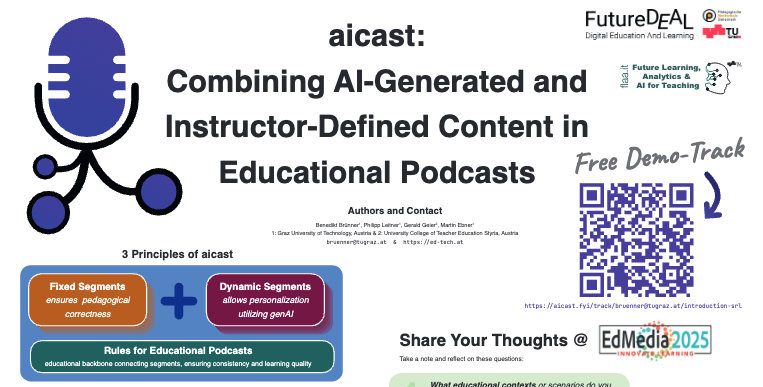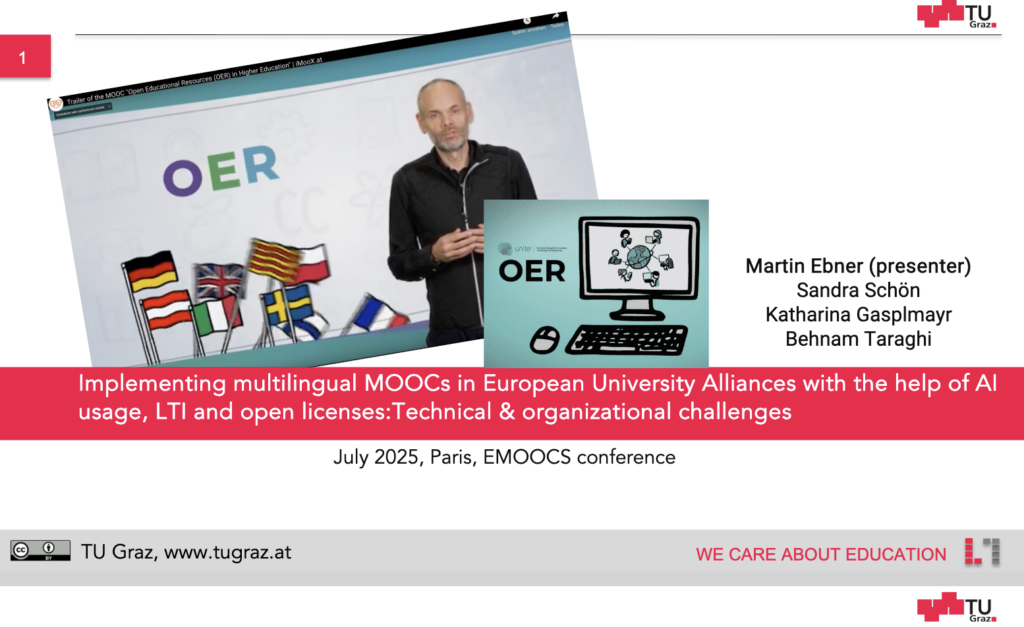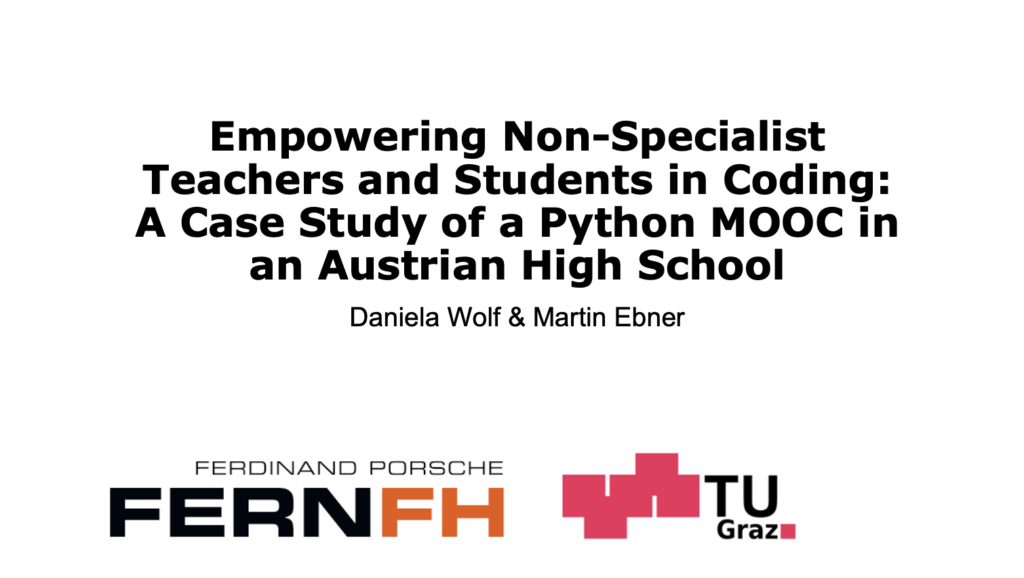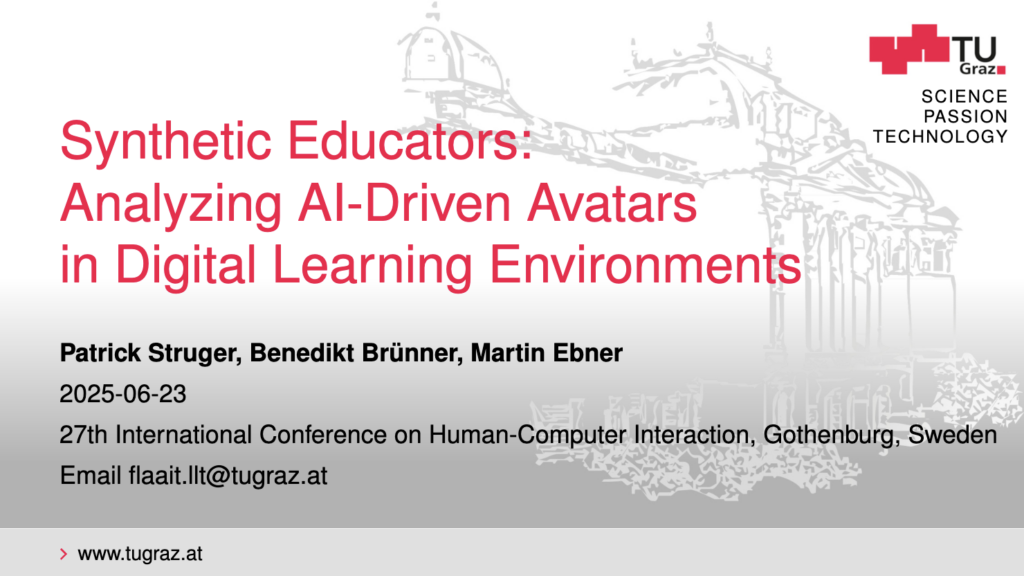At this year’s ED-Media conference in Barcelona we also presented a poster titled „aicast: Combining AI-Generated and Instructor-Defined Content in Educational Podcasts„
You can find the poster as well as the feedback now also online [here]


Digitale Lehre an und rund um der Technischen Universität Graz
At this year’s ED-Media conference in Barcelona we also presented a poster titled „aicast: Combining AI-Generated and Instructor-Defined Content in Educational Podcasts„
You can find the poster as well as the feedback now also online [here]

Es freut uns, dass wir heute den MOOC zu „Digitale Kompetenzen für Studienanfänger:innen“ starten können. Ein MOOC wo wir hoffen einen kleinen Beitrag zur Erhöhung der digitalen Kompetenzen leisten zu können. Aufbauend auf dem europäischen Rahmenwerk werden wir die nächsten Wochen die einzelnen Punkte versuchen kurz und knapp einzuführen und das mit einem speziellen Blickwinkel auf Studierende. Heute in Woche 1 gibt es das Einführungsvideo:
Und natürlich ist das alles kostenfrei und offen lizenziert – daher einfach anmelden, wir freuen uns auf viele Teilnehmer:innen:
[Kostenlose Anmeldeseite MOOC „Digitale Kompetenzen für Studienanfänger:innen„]
We also presented one paper within the Experience Track of the EMOOCs 2025 conference in Paris. This time the presentation was about „Implementing multilingual MOOCs in European University Alliances with the help of AI usage, LTI and open licenses: Technical & organizational challenges (Presentation)„. Our slides are, of course, available online.

Our second presentation at this year’s EMOOCS conference is about „Empowering Non-Specialist Teachers and Students in Coding: A Case Study of a Python MOOC in an Austrian High School„. Find here our slides:

Our first presentation at the EMOOCS 2025 conference in Paris is titled „Exploring genAI Chatbots in MOOCs: Analyzing Student Interactions and Self-Regulated Learning Behaviors„. Find here our slides:

Es freut uns sehr, dass wir an der TU Graz nun auch eine Online-Studienwahl-Tool anbieten können. Die Idee ist simpel: Wir würden gerne alle Interessierten, die vielleicht die Idee haben an der TU Graz zu studieren, die Möglichkeit geben, sich zu informieren und zu sehen welches Studium wirklich passt.
Der Prozess dazu war nicht einfach, aber alle Studiendekan:innen haben mitgeholfen und zusammen mit der jeweiligen Fakultät erarbeitet, was das eigene Studium für Anforderungen hat – nicht nur inhaltliche, sondern eben auch andere. Also ob vielleicht viel Ausdauer, Geduld, Genauigkeit etc. erforderlich ist. Aber was erzähl ich, schaut bitte einfach rein und vielleicht findet ihr das passende Studium für euch. Und natürlich würde ich mich sehr freuen, wenn es am Ende das Lehramt für Informatik und Digitale Grundbildung ist.
[Link zum StudyExplorer der TU Graz]

Our research about AI-Driven Avatars was presented at 27th International Conference on Human-Computer Interaction, Gothenburg, Sweden.

Struger, P., Brünner, B., & Ebner, M. (2025, Juni 23). Presentation: Synthetic Educators: Analyzing AI-Driven Avatars in Digital Learning Environments. Graz University of Technology. https://doi.org/10.3217/bngt5-p2053
Benedikt presented our research work at 27th International Conference on Human-Computer Interaction, Gothenburg, Sweden.

Brünner, B., & Ebner, M. (2025, Juni 23). Presentation: InfoFit and Beyond: AI Chatbots as EdTech Tools for Self-Regulated Learning in MOOCs. Graz University of Technology. https://doi.org/10.3217/4hn9k-bz211
At this year’s ED-Media conference, we also did a workshop on „Understanding the Core of LLMs as genAI -CollectiveGPT and Human Intelligence„. Find a short published summary about it.
Abstract:
This workshop provides an engaging and interactive exploration of Large Language Models (LLMs), with a focus on how they operate at a foundational level. Using CollectiveGPT, an educational chatbot developed by the Ed-Tech Research Community Graz, participants gained firsthand experience understanding the principles behind generative AI (genAI) systems such as ChatGPT. Designed for educators of all disciplines, the workshop demystifies key LLM concepts such as probability-based word prediction, contextual understanding, and the role of training data. Attendees generated texts and compare their results with real-time outputs from ChatGPT, highlighting the differences between human reasoning and AI prediction. Key topics include prompting techniques, context framing, training bias, misinformation, and ethical considerations in AI use. Participants explored system prompt injection techniques and developed advanced prompting skills to optimize responses from AI systems. This workshop empowered educators with the knowledge to critically evaluate and responsibly use AI tools in their teaching. By fostering AI literacy, attendees got clear understanding of how LLMs work and how they can be leveraged to enhance learning experiences across diverse educational settings.
[publication @ conference website]
[draft @ ResearchGate]
Reference: Brünner, B. & Ebner, M. (2025). Understanding the Core of LLMs as genAI – CollectiveGPT and Human Intelligence. In T. Bastiaens (Ed.), Proceedings of EdMedia + Innovate Learning (pp. 153-154). Barcelona, Spain: Association for the Advancement of Computing in Education (AACE). Retrieved June 14, 2025 from https://www.learntechlib.org/primary/p/226329/.
We also did workshops at this year’s ED-Media conference. One of them was titled „Workshop for Special Interest Group Emerging Technologies for Learning and Teaching: Exploring Educational Podcasts with AI“ and followed the idea of open discussions.
Abstract:
How can educators unleash the power of AI without losing control over core educational strategies? In this workshop, we introduced aicast, an open-source platform for educational podcasts that combines the best of both worlds: AI-generated elements for personalization and flexibility, and fixed elements, with instructor-defined content to ensure pedagogical accuracy. This hybrid approach reduces the risks associated with AI-generated materials like hallucinations. Attendees experienced how the platform utilizes LLMs like ChatGPT for personalized content authoring and ElevenLabs for high-quality voice synthesis, enabling real-time creation of educational audio content. After a short demo and hands-on session, participants engaged in a guided discussion: What is the core of an educational podcast? Most importantly from the perspective of an instructional designer, how must an educational podcast be? This session was part of the Special Interest Group on Emerging Technologies for Learning and Teaching at the ED-Media 2025 conference.
[draft @ ResearchGate]
[full article @ conference website]
Reference: Ebner, M. & Brünner, B. (2025). Workshop for Special Interest Group Emerging Technologies for Learning and Teaching: Exploring Educational Podcasts with AI. In T. Bastiaens (Ed.), Proceedings of EdMedia + Innovate Learning (pp. 1375-1376). Barcelona, Spain: Association for the Advancement of Computing in Education (AACE). Retrieved June 4, 2025 from https://www.learntechlib.org/primary/p/226347/.